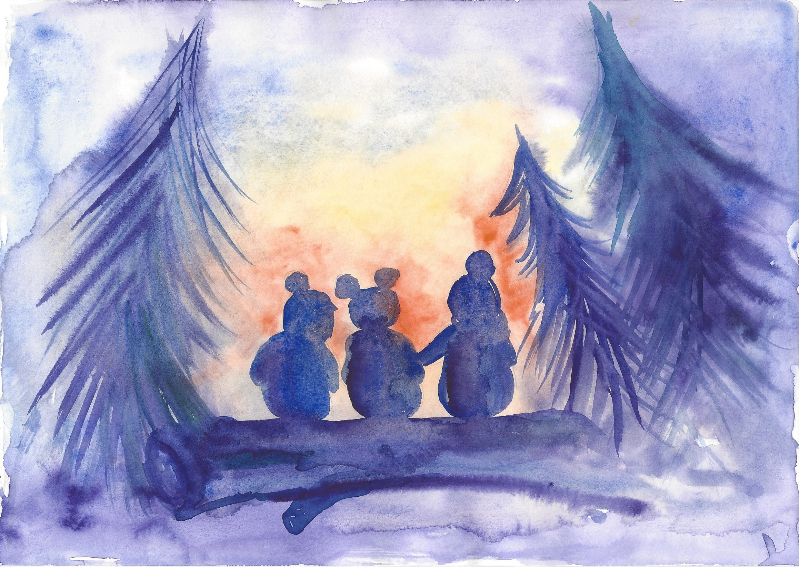Who We Are and How We Celebrate
This week I forgot Thanksgiving – I honestly did. A Swiss friend called to ask where to buy a good turkey, and I was dumbfounded. Not only had I forgotten Thanksgiving, I didn’t even know when it was.
Growing up in America, I always had the Thanksgiving holiday as an integral part of my existence. American colonists and the Wampanoag Indians shared an autumn feast almost 400 years ago, and since some point in time after that, millions of Americans have shared in the tradition of inviting friends and family into their homes annually to enjoy a feast together.
Figuring out what to do with 10 pounds of leftover turkey in the days following Thanksgiving has been the profound task of a majority of the modern American population. Yet after 11 years of living abroad, I seem to have completely mislaid this fundamental tradition that I would have otherwise automatically celebrated.
This made me consider how significantly celebrations are tied to the personal identities we form, varying according to the place we call home. From the outset of our lives, within the cultures and communities we inhabit, we are versed in what it means to express reverence or appreciation. The rituals and ceremonies that testify to a commonality amongst us instill in us a sense of association, acceptance and community. Before leaving your home country, you might have never realized that your habits of celebration had anything to do with where you lived. You might have thought that it is just the way things are. Personally, I had never considered Thanksgiving as an optional celebration. It was as much a part of me as my birthday is.
Take winter solstice as an example. It is a celebration of the rebirth of sunlight. Throughout history, celebrating the solstice has been a way to renew the connection with one another other and the supernatural, through acts of good will, special rituals, and heightened awareness. In Iran, families often kept fires burning all night to assist the battle between the light and dark forces. In ancient Rome, where it was called Dies Natalis Invicti Solis, or the Birthday of the Unconquered Sun, masters even celebrated as equals with their slaves.
Depending upon the society in which you live, you would regard and celebrate this tradition with great variation. It is in one’s society that personal identity is cultivated. As humans are social beings by nature, acceptance in societal groups is paramount for our overall general wellbeing. The Dalai Lama said, “We human beings are social beings. We come into the world as the result of others’ actions. We survive here in dependence on others. Whether we like it or not, there is hardly a moment of our lives when we do not benefit from others’ activities. For this reason, it is hardly surprising that most of our happiness arises in the context of our relationships with others.”
This means that if you pack up and move halfway around the planet, leaving one society for another, you typically will try your best to assimilate as much as possible into your new surroundings. Yet as the tapestry of all you know unravels, you might find the regularities, customs and ground rules changing. What you have become accustomed to celebrating – and how – might come under fire. Your children will learn new customs and traditions at school and in their community. Their innate need to be a part of a social group will drive them to convince you that it is necessary to, for example, carry a lantern through the dark for the Laternenfest.
You will learn that the Laternenfest is a Christian celebration held in honor of St Martin. You will find yourself amongst a group of other parents and their children walking down streets, through the cold and chilly air. Candle flames will light the night, in handmade lanterns, swinging from little hands. Songs will be sung, about lanterns and light in an unfamiliar or perhaps vaguely familiar language. At that point, or maybe when you go to bed that night, the realization will dawn on you that you took part in a celebration that you had never considered before that day. You may have lost a celebration, but you have gained one, too.
By Whitney Bushnell
Whitney is a Montessori teacher from the U.S. who is now living in Luzern. She is the mother of two children, a twenty-year-old and a two-and-a-half-year-old.
Illustration by Masha Ellis
Masha works as a product manager in the finance industry during the day and dedicates her spare time to art, cooking and her traditional nutrition blog. She is Australian with Ukranian roots and now lives near Lake Zurich with her little girl. To find out more, follow her on Facebook or visit her blog.




